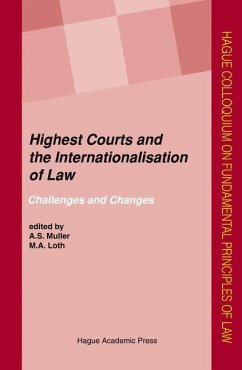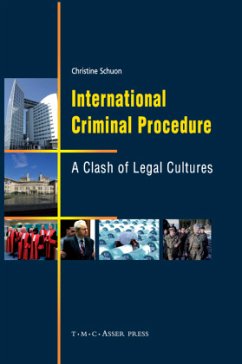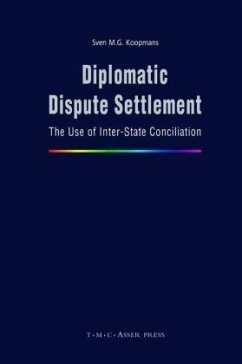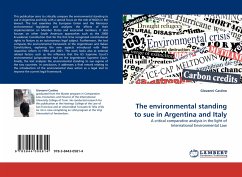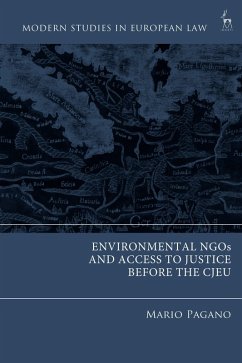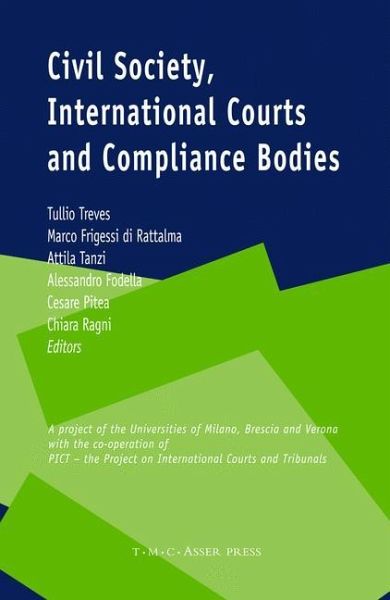
Civil Society, International Courts and Compliance Bodies
Versandkostenfrei!
Versandfertig in 6-10 Tagen
76,99 €
inkl. MwSt.

PAYBACK Punkte
38 °P sammeln!
The well-publicized contributions of civil society in setting items on the international agenda, in developing new international treaties, in exercising pressure on States in favour of or against the ratification of such treaties and in assisting the functioning of new institutions has attracted the attention of scholars who discuss the presence and the role of 'new actors' on the international stage. The role of civil society as regards international courts and tribunals, as well as compliance mechanisms set up especially in the environmental field, may be less well-known but is certainly no ...
The well-publicized contributions of civil society in setting items on the international agenda, in developing new international treaties, in exercising pressure on States in favour of or against the ratification of such treaties and in assisting the functioning of new institutions has attracted the attention of scholars who discuss the presence and the role of 'new actors' on the international stage. The role of civil society as regards international courts and tribunals, as well as compliance mechanisms set up especially in the environmental field, may be less well-known but is certainly no less important. This book explores this crucial area.
The attempt is timely and particularly relevant because of the continuous increase in the number of international courts, tribunals and compliance mechanisms. The areas of human rights, international criminal law and international environmental law are the main focus of the study, in the light of the well-established role of NGOs in Human Rights Courts and UN bodies as well as in the light of their remarkable success in setting up the International Criminal Court and the promising avenues which are now open in the compliance bodies of environmental law conventions. Broader questions and bodies such as the International Court of Justice, the International Tribunal for the Law of the Sea as well as European courts and tribunals are also included. The experience of a multinational group of academic scholars, judges and registrars of international tribunals, and experts from Non-Governmental Organizations, who have contributed to the book, provide it with the necessary variety of approaches and points of view.
This book is based on the results of a research project by the Universities of Milan, Brescia and Verona, supported by the Italian Ministry for University and Research, and by PICT, the London-New York Project on International Courts and Tribunals.
Tullio Treves is a Judge at theInternational Tribunal for the Law of the Sea and a Professor of International Law at the State University of Milano. Marco Frigessi di Rattalma teaches International Law at the University of Brescia. Attila Tanzi teaches International Law at the University of Verona. Alessandro Fodella teaches International Human Rights Protection at the University of Trento. Cesare Pitea and Chiara Ragni are research assistants at the University of Milan.
The attempt is timely and particularly relevant because of the continuous increase in the number of international courts, tribunals and compliance mechanisms. The areas of human rights, international criminal law and international environmental law are the main focus of the study, in the light of the well-established role of NGOs in Human Rights Courts and UN bodies as well as in the light of their remarkable success in setting up the International Criminal Court and the promising avenues which are now open in the compliance bodies of environmental law conventions. Broader questions and bodies such as the International Court of Justice, the International Tribunal for the Law of the Sea as well as European courts and tribunals are also included. The experience of a multinational group of academic scholars, judges and registrars of international tribunals, and experts from Non-Governmental Organizations, who have contributed to the book, provide it with the necessary variety of approaches and points of view.
This book is based on the results of a research project by the Universities of Milan, Brescia and Verona, supported by the Italian Ministry for University and Research, and by PICT, the London-New York Project on International Courts and Tribunals.
Tullio Treves is a Judge at theInternational Tribunal for the Law of the Sea and a Professor of International Law at the State University of Milano. Marco Frigessi di Rattalma teaches International Law at the University of Brescia. Attila Tanzi teaches International Law at the University of Verona. Alessandro Fodella teaches International Human Rights Protection at the University of Trento. Cesare Pitea and Chiara Ragni are research assistants at the University of Milan.





